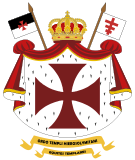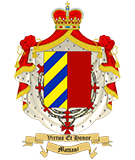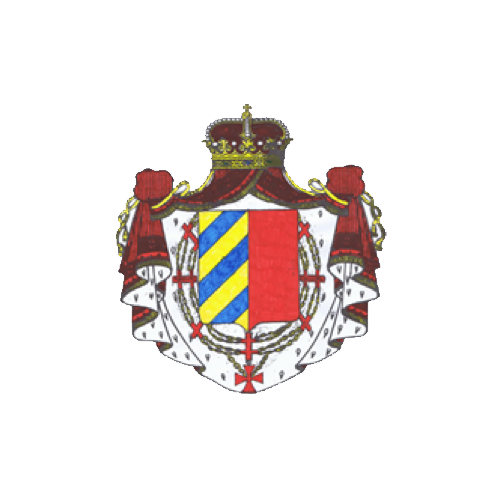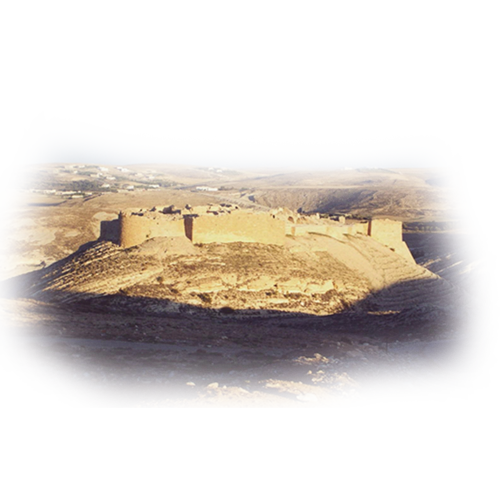


This charter is believed to be a forgery by most people who do not subscribe to the notion that the Knights Templar somehow managed to survive as a secretive organization after being officially disbanded in the 14th century.
Questa Charta è ritenuta da coloro che non aderiscono all’idea dei Cavalieri Templari come un falso. I Cavalieri Templari sono riusciti a sopravvivere come organizzazione segreta dopo essere stati ufficialmente sciolti nel 14° secolo.
The only way I can judge the authenticity of this text is by its language. For instance, I am quite surprised to find the phrase “ad majorem Dei gloriam” which was only used once (by pope Gregory the Great), as far as I can tell, before Ignatius Loyola created the the Jesuits’s famous motto. And yet, the author of the charter clearly uses these words as if they are formulaic! Another interesting feature is the phrase “privilegia contuli”.This simply cannot be found in any medieval text that I have access to. This formula, however, is used routinely (usually in the plural – contulimus) in university diplomas of the much later period. Undoubtedly, the creator of the Larmenius Charter had such a diploma!
L’unico modo in cui si può giudicare l’autenticità di questo testo è dalla sua lingua. Ad esempio, si è abbastanza sorpresi di trovare la frase “ad majorem Dei gloriam”, che fu usata solo una volta (da papa Gregorio Magno), per quanto si conosce, prima che Ignazio di Loyola creasse il famoso motto dei Gesuiti. Eppure, l’autore della Charta usa chiaramente queste parole come se fossero usuali. Un’altra caratteristica interessante è la frase “privilegia contuli”. Questo semplicemente non si trova in nessun testo medievale conosciuto. Questa formula, tuttavia, è usata abitualmente (di solito al plurale – contulimus) nei diplomi universitari di epoca molto successiva. Indubbiamente, il creatore
della Charta di Larmenius aveva un tale diploma!
“Ego frater Johannes Marcus Larmenius, hyerosolimitanus, Dei gratia et secretissimo venerandi sanctissimique martyris, supremi templi militiæ magistri (cui honos et gloria) decreto, communi fratrum consilio confirmato, super universum templi ordinem, summo et supremo magisterio insignitus, singulis has decretales litteras visuris, salutem, salutem, salutem.”
Io, fratello Giovanni Marco Larmenio, di Ierolimitano, per grazia di Dio, veneratissimo e segretissimo e santissimo martire, signore del supremo esercito del tempio (al quale onore e gloria) per decreto, confermato dal comune consiglio di i fratelli, segnati su tutto l’ordine del tempio, con il più alto e più alto magistero, vedranno ciascuna di queste lettere decretali saluto, saluto, saluto.
“Notum sit omnibus tam præsentibus quam futuris, quod, deficientibus, propter extremam ætatem, viribus, rerum angustia et gubernaculi gravitate perpensis, ad majorem Dei gloriam, ordinis, fratrum et statutorum tutelam et salutem, ego supra dictus, humilis magister militiæ Templi, inter validiores manus supremum statuerim
deponere magisterium: Idcirco, Deo juvante, unoque supremi conventus equitum consensu, apud eminentem commendatorem et carissimum, Franciscum Thomam Theobaldum Alexandrinum, supremum ordinis templi magisterium, auctoritatem et privilegia contuli, et hoc præsenti decreto, pro vita, confero cum potestate, secundum temporis et rerum leges, fratri alteri, institutionis et ingenii nobilitate morumque honestate præstantissimo, summum et supremum ordinis templi magisterium, sine commilitonum templi conventus; et, rebus ita sese habentibus, succesor ad nutum eligatur.”
Sia noto a tutti, presenti e futuri, che, quando vengono meno, a causa della loro estrema età, forza, angoscia e serietà delle cose, dopo aver considerato la gravità dell’argano, a maggior gloria di Dio, di ordine, dei fratelli, e degli statuti, protezione e sicurezza, come ho menzionato sopra, umile maestro della milizia del tempio, comprese le mani più forti, infine decido di deporre il magistero: Pertanto, con l’aiuto di Dio, e con il consenso di uno dei supremi consigli equestri, con l’eminente e amatissima lode, Francesco Tommaso Teobaldo di Alessandria, magistero supremo dell’ordine del tempio, ho conferito autorità e privilegi, e con questo presente decreto, a vita, conferisco con autorità, secondo le leggi del tempo e degli affari, a un altro fratello, con il più eccellente onore di istituzione e di nobiltà di carattere, il più alto dominio dell’ordine del tempio, senza essere ostacolati dai soldati del tempio; e, nell’interesse di coloro che lo sono, un successore sia eletto a loro piacimento.
“Ne autem languescant supremi officii munera, sint nunc et perenniter quatuor supremi magistri vicarii; supremam potestatem, eminentiam et auctoritatem; super universum ordinem, salvo jure supremi magistri habentes; qui vicarii magistri apud seniores secundum professionis seriem eligantur. Quod statutum è commendato mihi et fratribus voto sacrosancti suprà dicto venerandi beatissimique magistri nostri, martyris (cui honos et gloria) amen.”
Ma affinché i doni dell’ufficio supremo non languiscano, vi siano ora e perennemente i quattro capi vicari; potere supremo, eminenza e autorità; avendo su tutto l’ordine, fermo restando il diritto del maestro supremo; devono essere eletti assistenti maestri tra gli anziani secondo il corso della loro professione. Il quale statuto è stato affidato a me e ai miei fratelli dal voto del santissimo sopra menzionato, del nostro venerato e beato maestro, martire (al quale onore e gloria) amen.
Ego denique, fratrum supremi conventus decreto, è suprema mihi comissa auctoritate, Scotos Templarios ordinis desertores, anathemate percussas, illosque et fratres sancti Johannis hyerosolimae, dominiorum militiæ spoliatores (quibus apud Deum misericordia) extrà girum templi, nunc et in futurum, volo, dico et jubeo.
Infine, per decreto della suprema assemblea dei fratelli, affidatami dalla suprema autorità, i Templari scozzesi, disertori dell’ordine, colpiti dall’anatema, e quelli e i fratelli di San Giovanni di Gerusalemme, saccheggiatori dell’esercito delle signorie (a cui è misericordia di Dio) fuori dal tempio, ora e in futuro, lo dico e comanderò.
Signa, ideo, pseudo-fratribus, ignota et ignoscenda constitui, ore commilitonibus tradenda, et quo, in supremo conventu, jam tradere modo placuit.
Quæ vero signa tantummodo pateant post debitam professionem et æquestrem consecrationem, secundùm templi commilitonum statuta, ritus et usus, suprà dicto eminenti commendatoris à me transmissa, sicut à venerando et sanctissimo martyre magistro Jacobo de Molaya (cui honos et gloria) in meas manus habui tradita. Fiat sicut dixi fiat. Amen.
Le norme dunque le ho stabilite, sconosciute ai falsi fratelli, che devono essere perdonati, da tramandare per bocca dei nostri soldati; e che si è già deciso di consegnare in sede di assemblea finale. Tali segni potranno essere aperti solo dopo la debita professione e consacrazione equestre, secondo gli statuti, i riti e le pratiche dei compagni del tempio, trasmessimi dal citato eminente commendatario. Sia come ho detto, così sia. Amen.
Ego Johannes Marcus Larmenius dedi, Parisii die decima tertia februarii 1324.
Ego Franciscus Thomas Theobaldus Alexandrinus, Deo jurante, supremum magisterium acceptum habeo, 1324.
Ego Arnulphus De Braque, Deo juvante, supremum magisterium acceptum habeo, 1340.
Ego Joannes Claromontanus, Deo juvante, supremum magisterium acceptum habeo, 1349.
Ego Bertrandus Gueselin, Deo juvante, supremum magisterium acceptum habeo, 1357.
Ego Johannes Arminiacus, Deo juvante, supremum magisterium acceptum habeo, 1381.
Ego Bernardus Arminiacus, Deo juvante, supremum magisterium acceptum habeo, 1392.
Ego Johannes Arminiacus II, Deo juvante, supremum magisterium acceptum habeo, 1419.
Ego Johannes Croyus, Deo juvante, supremum magisterium acceptum habeo, 1451.
Ego Robertus Lenoncurtius, Deo juvante, supremum magisterium acceptum habeo, 1478.
Ego Galeas de Salazar, Deo juvante, supremum magisterium acceptum habeo, 1497.
Ego Philippus Chabotius, Deo juvante, supremum magisterium acceptum habeo, 1516.
Ego Gaspardus de Salciaco Tavanneusis, Deo juvante, supremum magisterium acceptum habeo, 1544.
Ego Henricus De Monte Morenciaco, Deo juvante, supremum magisterium acceptum habeo, 1574.
Ego Carolus Valesius , Deo juvante, supremum magisterium acceptum habeo, 1616.
Ego Jacobus Ruxellius de Granceio, Deo juvante, supremum magisterium acceptum habeo, 1651.
Ego Jacobus Henricus de Duroforti, dux de Duras, Deo jnvante, supremum magisterium acceptum habeo, 1681.
Ego Philippus, dux Aurelianensis, Deo juvanle, supremum magisterium acceptum habeo, 1705.
Ego Ludovicus.Augustus Borbonius, dux du Maine, Deo juvante, supremum magisterium acceptum habeo, 1724.
Ego Ludovicus Henricus Borbonius Condœus, Deo juvante, supremum magisterium acceptum habeo, 1737.
Ego Ludovicus Franciscus Borbonius Conty, Deo juvante, supremum magisterium acceptum habeo, 1741.
Ego Ludovicus Henricus Timoleo de Cossé-Brissac, Deo juvante, supremum magisterium acceptum habeo, 1776.
Ego Claudius Mathæus Radix de Chevillon templi senior vicarius magister, adstantibus fratribus prospere Maria Petro Michaele Charpentier de Sainiot, Bernardo Raymundo Fabré, templi vicariis magistris et Johanne Baptista de Courchant, supreme proeceptore , hasce litteras decretales à Ludovico Timoleone de Cossé-Brissac, supremo magistro, in temperibus infaustis mihi depositas, fratri Jacobo.Philippo Le Dru, templi seniori vicario magistro tradidi, ut istæ litteræ, in tempore opportuno, ad perpetuam ordinis nostri memoriam, juxtà ritum orientalem vigeant. Die decimâ junii 1804.
Ego Bernardus Raymundus Fabre, Deo juvante, supremum magisterium acceptum habeo , die quarta novembrii 1804.
TRANSLATION (from A. G. Mackley’s “An encyclopaedia of freemasonry and its kindred sciences”).
I, Brother John Mark Larmenius, of Jerusalem, by the grace of God and the secret decree of the most venerable and holy martyr, the Grand Master of the Soldiery of the temple, to whom be all honor and glory, confirmed by the common council or the Brethren, being endowed with the Supreme Grand Mastership of the whole Order of the Temple, to every one who shall see these Letters Decretal thrice greeting:
Be it known to all, both present and to come, that the failure of my strength, on amount of extreme age, my poverty, and the weight of government being well considered I, the aforesaid humble Master of the Soldiery of the temple, have determined, for the greater glory of God and the protection and safety of the Order, the Brethren, and the statutes, to resign the Grand Mastership into stronger hands.
On which account, God helping, and with the consent of a Supreme Convention of Knights, I have conferred and by the present decree do confer, for life, the authority and prerogatives of Grand Master of the Order of the Temple upon the Eminent Commander and very dear Brother, Francis Thomas Theobald Alexandrinus, with the power, according to time and circumstances, of conferring the Grand Mastership of the Order of the Temple and the supreme authority upon another Brother, most eminent for the nobility of his education and talent and decorum of his manners: which is done for the purpose of maintaining a perpetual succession of Grand Masters, an uninterrupted series of successors, and the integrity of the statutes. Nevertheless, I command that the Grand Mastership shall not be transmitted without the consent of a General Convention of the fellow-soldiers of the Temples as often as that Supreme Convention desires to be convened, and, matters being thus conducted, the successor shall be elected at the pleasure of the knights.
But, lest the powers of the supreme office should fall into decay, now and for ever let there be four Vicars of the Grand Master, possessing Supreme power, eminence, and authority over the whole Order, With the reservation of the rights of the Grand Master, which Vicars of the (Grand Masters shall be chosen from among the alders, according to the order of their profession. Which is decreed in according with the above-mentioned wish, commended to me and to the Brethren by our most venerable and most blessed Master, the martyr, to whom be honor and glory. Amen.
Finally, on consequence of a decree of a Supreme Convention of the Brethren, and by the supreme authority to me committed, I will, declare, and command that the Scottish exemplars, as deserters from the Order, are to be accursed, and that they and the brethren of Saint John of Jerusalem, upon whom may God have mercy, as spoliators of the domains of our soldiery are now and hereafter to be considered as beyond the pale of the Temple I have therefore established signs, unknown to our false Brethren, and not to be known by them, to be orally communicated to our fellow-soldiers, and in which way I have already been pleased to communicate them in the Supreme Convention.
But these signs are only to be made known after due profession and knightly consecrations according to the Statutes, Rites, and Usages of the fellow-soldiery of the Temple, transmitted by me to the above-named Eminent Commander as they there delivered into my hands by the venerable and most holy martyr, our Grand Master, to whom be honor and glory. Let it be done as I have said. So mote it be. Amen.
I, John Mark Larmenius, have done this on the thirteenth day of February, 1324.
I, Francis Thomas Theobaldus Alexandrinus, God helping, have accepted the Grand Mastership, 1324.
And then follow the acceptances and signatures of twenty-two succeeding Grand Masters-the last, Bernard Raymund Fabre, under the date of 1804.



© 2025 - Sovrano Ordo Templi Hierosolymitani - Equites Templares